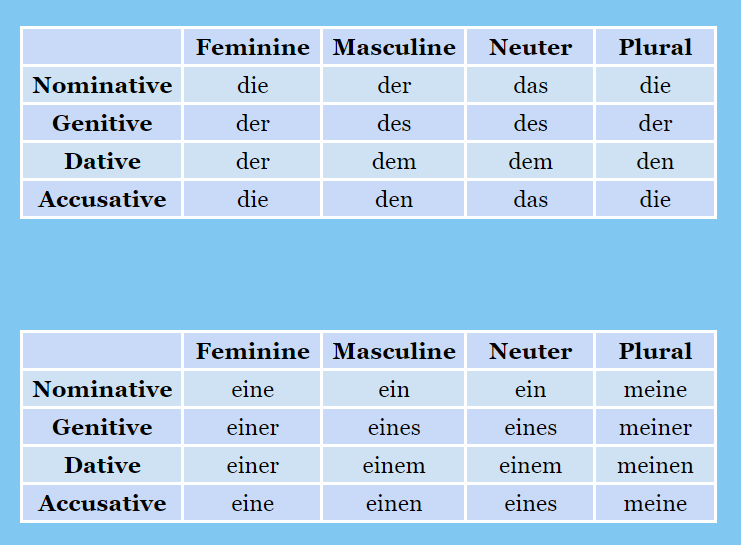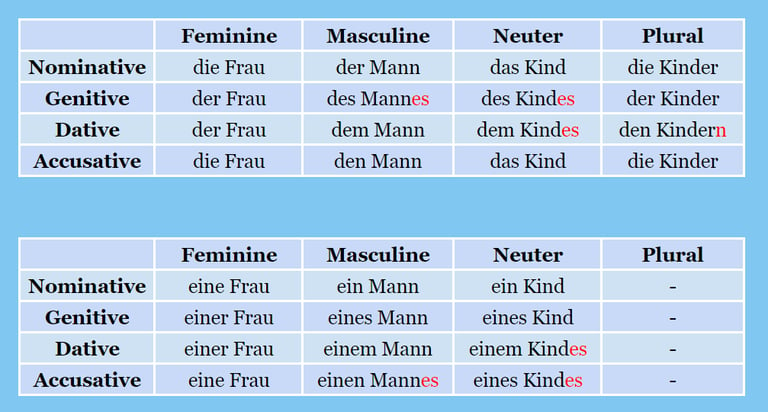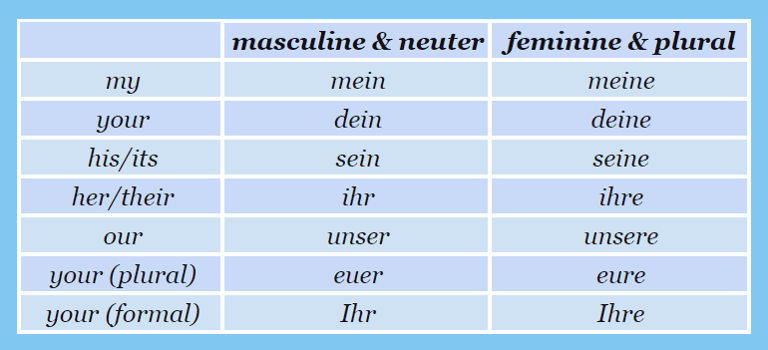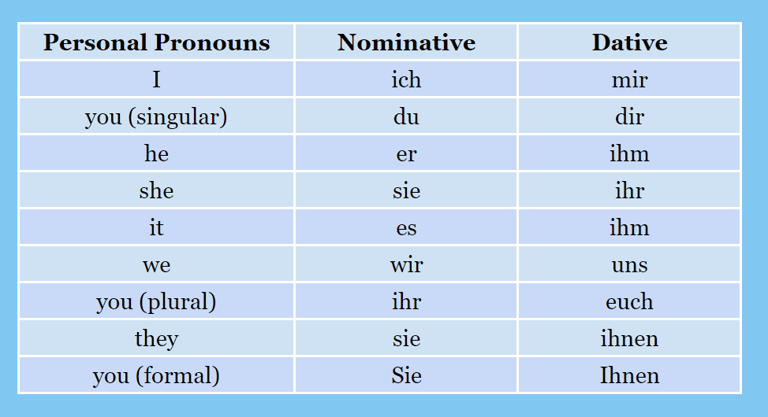Articles & cases
Articles
Dieser
The german equivalent for "this" or "these"
Other than articles and possessive determiners, there are other “little words” that often come in front of German nouns with different endings/forms than articles. You will have to remember these.
They follow the same pattern as dieser.
alle (all)
beide (both)
einige (some)
jeder (each, every)
jener (that)
mancher (some, many)
mehrere (several)
solcher (such)
viele (much, many)
welcher (which)
wenige (few)


Prepositions that indicate location/direction and can be paired with either dative or accusative
To decide if to use dative or accusative, remember this simple rule:
*** If you’re talking about direction, use the accusative.
(ex: Ich gehe in die Stadt. I go to town.
This means you are moving and answers the question "Wohin? Where?")
*** If you’re talking about location/position, use the dative. (ex: Ich bin in der Stadt. I am in town. In this case, you are not moving so it answers the question "Wo bist Du? Where are you?")
an – on
auf – on
hinter – behind
in – in
neben – beside
über – over, above, about
unter – under
vor – in front of, before
zwischen – between, among


Examples


Preposition + article
bei + dem = beim - at the
zu + dem = zum - to the
zu + der = zur - to the
von + dem = vom - from the
in + dem = im - in the
an + dem = am - at the/on the
in + das = ins - into the
an + das = ans - on the/to the
auf + das = aufs - on the
Genitive
Genitive - expresses possesion, relationship or origins
Examples:
Das Buch des Mannes - the man's book
In this example, the book is the man's possesion.
Genitive prepositions:
(an)statt – instead of
trotz – despite, in spite of
während – during (refering to time)
wegen – because of
Accusative
Akkusativ - represents the direct object, the receiver of the action
Akkusativ - Wohin?
in + das - ins
an + das - ans
Accusative prepositions:
bis – as far as, by, until
durch – through, across
für – for
gegen – against
ohne – without
um – around, about, at
How to use them correctly
Nouns cand be can combined with possessive articles like mein (my), dein (your), sein (his/its) etc.
These possessive articles change depending on gender of the noun or if is singular/plural, as you can see in the table above: masculine and neuter have no ending while feminine and plural have an -e added.
Examples:
Sie gibt mir ihre Nummer. - She gives me her number. (die Nummer - feminine, singular)
Das ist seine Frau. - That's his wife. (die Frau - feminine)
Das ist dein Mann. - That's your husband. (der Mann - masculine)
Das sind unsere Kinder. - Those are our children. (Kinder - plural)


Possessive articles (mein/dein/sein/unser ...)
bis
durch
ohne
gegen
um
für
Akkusativ
WOHIN...?
Dativ
WO...?
an
von
über
unter
zwischen
in
auf
neben
hinter
bei
mit
von
seit
ab
nach
aus
zu
außer
gegenüber
Nominativ (nominative) - the subject, who or what is performing the action?
Genitiv (genitive) - expresses possesion, relationship or origins
Dativ (dative) - represents indirect object, to or for whom is the action performed
Akkusativ (accusative) - represents the direct object, the receiver of the action
Conclusions:
Dativ: Wo? (Where?) when you’re talking about the location/position
Akkusativ: Wohin? (where to?) - when referring to direction/movement
Examples:
Öffne diese Tür. - Open this door. (die Tür)
Ich mag dieses Lied. - I like this song. (das Lied)
In dieser Stadt ist viel los. - There's lots to do in this city. (die Stadt)
Dieser Eimer leckt. - This bucket leaks. (der Eimer)
Dative is known as Wem-Fall because it is used as indirect object, to whom or for whom is the action done. Asks/answers questions beginning with Wem/Was
Prepositions that always take Dative, you'll have to memorize these.
aus – out of, from
bei – by, at
gegenüber – opposite, towards
mit – with
nach – to, after, according to
seit – for, since
von – from, of
zu – to, at, for
Dative
Verbs that demand the dative case:
passen - to fit, to match, to adjust
danken -to thank, to praise
antworten – to answer
danken – to thank
einfallen – to occur, to think of
fehlen – to be missing
folgen – to follow
gefallen – to like
gehören – to belong to
glauben – to believe
gratulieren – to congratulate
helfen – to help
Leid tun – to be sorry
passieren – to happen
verzeihen – to forgive
wehtun – to hurt
schmecken - to taste, to enjoy

